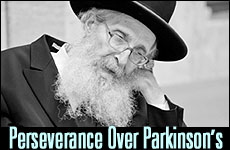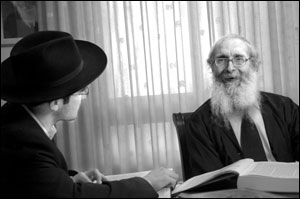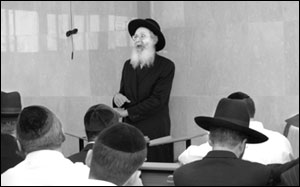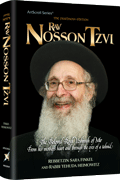 Vampire Weekend's Surprising Jewish Stories
Vampire Weekend's Surprising Jewish Stories


12 min read
Rav Nosson Tzvi Finkel refused to be enslaved by his debilitating disease.
Excerpted from Rav Nosson Tzvi: The Beloved Rosh Yeshiva of Mir; From His Mother's Heart, and through the eyes of a Talmid
One of the first things — often the first thing — that anyone noticed about Rav Nosson Tzvi Finkle, the great Rosh Yeshiva of Mir, during the last 28 years of his life was the Parkinson’s disease that afflicted him. At good times, his body would merely shake; at harder times, he would thrash about spastically.
Parkinson’s is a degenerative disease that robs a person of the ability to control his muscles. In addition, Parkinson’s sufferers experience extreme weakness and emotional pain, and most people diagnosed with later-stage Parkinson’s end up bedridden for the rest of their lives.
At the shivah for Rav Nosson Tzvi, a man who arrived in a wheelchair said that he has had Parkinson’s for several years, and although he was a talmid chacham, a Torah scholar, he had not opened a Gemara from the time he was afflicted. He often didn’t even make it to shul to pray.
Despite his Parkinson’s, Rav Nosson Tzvi built the biggest Torah empire in the world.
That statement alone would have been an eye-opener to those at the shivah. After all, Rav Nosson Tzvi had not only prayed regularly in the yeshiva and learned for many, many hours each day while suffering for 28 years, but he had also built the biggest Torah empire in the world during that time, taking the massive financial responsibility for the yeshiva’s growth on his weary shoulders – while finding the time and patience to impart warmth and love to every one of his students. To hear that a Parkinson’s victim who had the disease for a few years couldn’t go to shul or open a Gemara suddenly cast Rav Nosson Tzvi in a greater light than anyone had fathomed.
 But the visitor in the wheelchair topped his initial revelation when he informed the family that he shared the same doctor as Rav Nosson Tzvi, and the doctor had told him that the severity of his case was approximately one-tenth of Rav Nosson Tzvi’s.
But the visitor in the wheelchair topped his initial revelation when he informed the family that he shared the same doctor as Rav Nosson Tzvi, and the doctor had told him that the severity of his case was approximately one-tenth of Rav Nosson Tzvi’s.
The story of his leadership of the Mir goes far beyond his triumph over a dreadful disease. He would have been remembered for generations as one of the great Torah giants and Torah builders of modern times even if he had been healthy. That he achieved what he did despite his debilitating illness is a remarkable lesson and inspiration for everyone, and the stories of how he transcended his physical limitations are an indelible part of his legacy.
Rabbi Gedalya Finkel, Rav Nosson Tzvi’s younger brother, relates that one of Rav Nosson Tzvi’s doctors once remarked that everyone thinks that he came to the house to help Rav Nosson Tzvi, but in reality, he gained more from those visits than Rav Nosson Tzvi did, because he would leave the house so inspired by the Rosh Yeshiva.
Early Signs
In 1984, Rav Nosson Tzvi began to show the first signs of Parkinson’s disease. The symptoms were barely noticeable at first – students from the earlier years didn’t even notice that he was ill – but it was clear to the people close to him that it was only a matter of time until his condition would deteriorate. Many people in his situation would have tried to hide the disease for as long as possible, but Rav Nosson Tzvi quietly informed those who were close to him so they wouldn’t be hurt later when they found out that he hadn’t told them.
Not long after he was first diagnosed, he began to develop noticeable symptoms. His hands started shaking so badly he could barely open things. Nevertheless, he refused people’s offers for help, preferring to keep trying himself.
From that early phase of his illness until his last day, he continued to insist on doing whatever he could for himself. Although he would eventually require help even with basic functions, whatever he could do himself, he did.
No Complaints
“My feeling was always that he simply didn’t consider the illness his issue,” says Rav Binyamin Carlebach, Rav Nosson Tzvi’s brother-in-law and closest partner in maintaining and building the yeshiva. “It was a part of his life that he had to contend with, but he would invest as little effort as possible into dealing with it.”
 Parkinson’s gradually robs its victims of the ability to perform even the most basic daily tasks, such as cutting food and eating it. Aside from the frustration of not being able to care for themselves, Parkinson’s sufferers experience significant embarrassment when they are seen in public shaking violently or when their bodies are wracked with spastic, uncontrollable movements.
Parkinson’s gradually robs its victims of the ability to perform even the most basic daily tasks, such as cutting food and eating it. Aside from the frustration of not being able to care for themselves, Parkinson’s sufferers experience significant embarrassment when they are seen in public shaking violently or when their bodies are wracked with spastic, uncontrollable movements.
“I decided that I can’t let it stop me from doing what I have to do.”
It would have been understandable, even expected, for someone in Rav Nosson Tzvi’s position to shy away from public appearances, and certainly to remain out of the view of students at times when he was extremely weak. But as Rav Binyamin Carlebach once heard Rav Nosson Tzvi relate to a fellow who was stricken with a different muscular disease, “I decided that I can’t let it stop me from doing what I have to do.”
He would encourage other people with disabilities to make a similar resolution, so that they could lead fulfilling lives.
Rav Nissan Kaplan related that after the Rosh Yeshiva passed away, he heard that a relative of the Rosh Yeshiva had testified that he never heard him complain about his disease. Rav Nissan was so surprised by this claim that he decided to verify it. When he visited Rav Nosson Tzvi’s children during the shivah, he asked each one whether they had ever heard Rav Nosson Tzvi complain – and each one said no!
Not only didn’t he complain, he didn’t even consider himself unfortunate. A student who had been struck by several tragedies in the span of a few months came to the Rosh Yeshiva for inspiration. “How does the Rosh Yeshiva learn amidst suffering?” he asked.
“I don’t learn amidst suffering,” the Rosh Yeshiva replied. “I learn amidst joy!”
Torah Comes First
Rav Nosson Tzvi’s priority scale was clear: Any yeshiva obligation overrode the need to take care of his Parkinson’s.
Before leaving to America with the Rosh Yeshiva, the Rebbetzin would sometimes schedule an appointment with a specialist there, hoping that he might be able to suggest a new treatment plan. But if the Rosh Yeshiva would learn that a philanthropist was available to meet him at the time of the doctor’s appointment, he would immediately cancel the appointment and meet with the potential donor.
Rav Nosson Tzvi was also adamant about not sacrificing his mental acuity for the sake of alleviating his physical symptoms. He refused to take any medicine that would impair his ability to concentrate on learning or was liable to affect his memory. Nor was he willing to undergo any invasive procedures – even those that had excellent success rates – for fear that they would inflict lasting damage on his brain or cause him to forget his learning. The only medications he took were those that provided temporary relief from his symptoms, allowing him to function at some level, but no more than that.
“I Tried, I’m Sorry …”
In the late 1980s and early '90s, Rav Nosson Tzvi used to give his daily Talmud class in a room that is now the library in the yeshiva’s main building. Often, he had to struggle mightily to drag his body up the two flights of stairs, and when he finally did reach the classroom he would take a few minutes to gather his strength.
Many times, he would start delivering the class, but after a while he would stop and whisper, “I’m sorry, but I just can’t.” He would wait a few minutes and try to regain some strength before continuing. Sometimes he succeeded in finishing the class after taking a break, but sometimes he was forced to end it early. His mind was perfectly clear, and he remembered all the intricate logical arguments he had prepared, but his body simply wouldn’t cooperate.
Pushing to the point of not getting a word out was an unbelievable lesson in love of Torah.
“The classes when he stopped in the middle actually left a deeper impression on us than some of his regular classes,” recalls Dovid, a student from those years. “Seeing him push himself to the point where he absolutely could not get a word out of his mouth was an unbelievable lesson in love of Torah and self-sacrifice for Torah. That lesson remained with us long after we forgot the actual Torah insights he had composed.”
Likewise, in the years closer to his passing, even on days when he was too weak to give one of his myriad weekly learning sessions, he wouldn’t cancel them. They would come, and he would try to give the talk. If he couldn’t continue, he would say, “I can’t.” Once, he reached a point where he couldn’t even move his lips to mouth the words “I can’t.” Instead, he asked someone to pass him a piece of paper, and he wrote, “Nisiti, selichah — I tried, I’m sorry.”
The Rosh Yeshiva was never self-conscious about his flailing, feeble body, even when he had a roomful of people waiting for him to find his voice and continue speaking. Often, he would crack a joke to assuage the discomfort of the students.
The Illness – for Everyone Else
On a philosophical level, Rav Nosson Tzvi seemed to have two different approaches to understanding his illness.
One approach emerged in conversation with a certain rosh yeshiva, when Rav Nosson Tzvi admitted that he had absolutely no inner desire for bitul Torah (neglecting his learning); so strong was his love for Torah that he simply had no interest in wasting time with idle pursuits. “Perhaps Hashem gave me this illness,” he mused, “because He wanted to make it harder for me to learn so that I could get reward for learning despite the difficulty.”
The second approach was even more sobering. Rabbi Nochum Stilerman once visited Rav Nosson Tzvi’s home shortly after the latter became Rosh Yeshiva. There was a bottle of soda on the table, and Rav Nosson Tzvi wanted to honor his guest by pouring him a cup of soda. When Reb Nochum saw the Rosh Yeshiva trying to pour him a drink, he said that he wasn’t thirsty. “I have to pour my guest a drink,” said Rav Nosson Tzvi. “If you don’t want to drink it, that’s your business.”
He tried to lift the bottle and pour the drink, but his hands refused to cooperate. Reb Nochum was so disturbed by the sight of the Rosh Yeshiva struggling to pour a cup of soda that he blurted out, “Rosh Yeshiva, why do you deserve this?”
As soon as those words left his mouth, Reb Nochum wished he could somehow retract them. But it was too late.
“I was wondering the same thing,” replied Rav Nosson Tzvi. “And I think I know the reason.
“I love learning. In fact, I love learning so much that I think there’s no way I can learn Torah lishmah (for its own sake), because I enjoy it too much. Maybe I was stricken with this disease as a punishment for not learning Torah lishmah.”
Reb Nochum left the Rosh Yeshiva’s house deeply saddened, and stunned at the possibility that the Rosh Yeshiva’s Parkinson’s could be a punishment.
Twenty years passed, and the Rosh Yeshiva’s condition continued to deteriorate. During the last year of Rav Nosson Tzvi’s life, around Pesach time, Reb Nochum came across a Gemara in Talmud Yerushalmi, and was so excited by what he saw that he hurried to show it to the Rosh Yeshiva.
The Talmud Yerushalmi (Horayos 3:5) teaches that when Moses ascended to the Heavens and learned Torah there for 40 days and nights, he kept forgetting everything Hashem taught him. At the end of the 40 days, he received the entire Torah as a gift.
“Why?” asks the Talmud Yerushalmi. “Bishvil lehachzir es hatipshim — so there will be a response to the fools.”
“Imagine Moses’ plight,” Reb Nochum said to the Rosh Yeshiva. “He’s in Heaven learning from Hashem Himself, and each time he walks away for a moment and says, ‘What did I just learn?’ he draws a total blank. It must have been so frustrating.
“Why did Hashem do that to him? So that some unwise people who feel that they can’t learn because they keep forgetting the material will take heart and say, ‘If Moses could forget what he learned and still continue studying Torah, so can we.’ ”
Reb Nochum then reminded Rav Nosson Tzvi that 20 years earlier, the Rosh Yeshiva had suggested that his Parkinson’s was a punishment for not learning for its own sake. “Maybe there’s a different reason,” suggested Reb Nochum. “Maybe the Rosh Yeshiva had to suffer from this illness so that in case any of us would say that we can’t learn because we aren’t feeling up to it, we would have the Rosh Yeshiva to look to as proof that one can learn even with a debilitating disease.”
 The Rosh Yeshiva kissed Reb Nochum and said, paraphrasing a Gemara, “Akiva you have comforted me, “Akiva you have comforted me.”
The Rosh Yeshiva kissed Reb Nochum and said, paraphrasing a Gemara, “Akiva you have comforted me, “Akiva you have comforted me.”
Click here to purchase your copy of Rav Nosson Tzvi, published by Artscroll.
